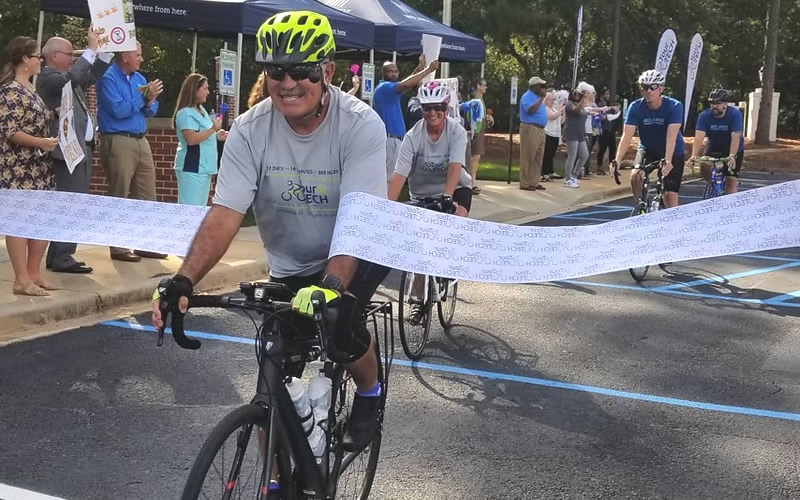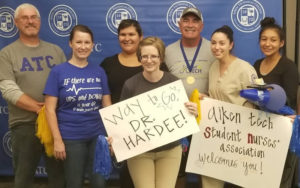
By Lindsay Street, Statehouse correspondent | If you want to find out what it’s like to cycle South Carolina during an unusually hot fall and hurricane season, all you have to do is ask Tim Hardee.
Hardee, president of the S.C. Technical College System, recently finished up an 800-mile slog last Friday, Oct. 12, at Horry-Georgetown Technical College in Conway after beginning at York Technical College in Rock Hill two weeks earlier. During that time, the state was hit with flooding weeks after Hurricane Florence’s landfall and then more rain came from Tropical Storm Michael. All the while, Hardee kept pedaling, his wife by his side
The adventure, called Tour de Tech after the world-known cycling race Tour de France, raised about $90,000 for student scholarships through corporate sponsorships. It also raised awareness about these higher education institutions, Hardee told Statehouse Report.
“It was well worth riding 800 miles on the bike to raise the scholarship money,” he said.
Hardee’s trip came as the schools are gaining popularity among students and employers in the state.
“(In the past, the schools were for) students unable to attend a four year institution. Now, it has become more of a priority choice for students who view it as, ‘For me, to enter the job market in a good-paying job quickly,’” Hardee said.
The value of technical education
Students can either earn a certificate or two-year degree and quickly enter the workforce, or they can go to tech schools for two years before transferring to a four-year college and save on tuition, he said.
S.C. Commission on Higher Education Executive Director Jeff Schilz told Statehouse Report that technical colleges can give students a good bang for their buck.
“More and more students are going to technical college for the community college side of things because they feel like they can get the general education at a reduced rate and it’s more convenient closer to home,” Schilz said.
The Commission on Higher Education has had a tour of its own across the state: asking higher education stakeholders to comment on their experiences as tuition rates rise around the state. Recently, it has floated freezing tuition hikes at four-year institutions. But Schilz said technical colleges in the state haven’t been the focus of student and parent ire.

Hardee said technical colleges in the state have three things going for them: affordability, accessibility and relevance. He said the cost of tuition is about a third of what four-year institutions cost. Next, a technical college is located within 30 minutes of every S.C. resident (and 95 percent of technical college students are in-state). And finally, technical colleges provide geographically-relevant job training.
For example, if you’re near BMW in Greer, you can get training relevant for jobs that area, but if you’re near Myrtle Beach, you will receive a different kind of training more attuned to the tourism industry.
“They supply workers to a lot of companies that come to South Carolina,” Schliz said. He said that recently Volvo hired its 1,000th worker and that was attributed to Trident Technical College’s work in preparing its students through the state’s ReadySC program.
A listening tour
On the road, Hardee said he heard from businesses that relied on technical colleges for their workforce. He recalled that at Williamsburg Technical College in Kingstree, one employer said his workforce was made possible by the college.
“A lot of times we think of (technical colleges) in terms of BMW and Volvo, but this was a small industry that employed less than 50 people,” Hardee said. “He was able to benefit from the technical college.”
Unlike most public higher education institutions in the state, the technical college system is receiving more money than at the start of the great recession in 2008 — a pivotal moment for state-funded institutions. From a draft 2018 report by the S.C. Commission on Higher Education, a comparison of state dollars for universities shows:
- Clemson University received $86 million in state funds in 2008-09, and received little more than $80 million eight years later;
- The University of South Carolina’s main campus received $140 million million in 2008-09 and receive $127.6 million in 2016-17; but,
- Technical colleges in the state received $124 million in 2008-09 and received $128.4 million in 2016-17.

In other words, between 2008-09 and 2016-17, the state appropriated nearly 7 percent fewer dollars toward four-year higher education, but during that same time, technical colleges received 3.5 percent more funding.
“The legislature has continued to invest in the technical colleges, and I think the reason for that is that they view us as good investment,” Hardee said. “They recognize that, if the state is going to attract Volvo and Mercedes Benz vans and Michelin, then you have to have skilled workforce.”
Hardee said that while the state has continued to fund the technical colleges adequately in the state, the schools need more money allocated to keep training equipment up-to-date. In the 2018-19 budget, $11 million was allocated for such purchase, but that number gets eaten up quickly by 16 schools, he said.
Over the last five years, tuition has gone up 2 percent to 3 percent on average each year, Hardee said. That’s about on par with other higher education institutions in the state. At Clemson and University of South Carolina this year, students saw a rise in tuition at 1.75 percent and 2.9 percent respectively.
Hardee said that on his cycling tour, he spoke with students about the obstacles they face.
“Students were so appreciative of the financial support (offered through the school through the Tour de Tech fundraising),” Hardee said. He added that schools try to keep tuitions as low as possible, saying that sometimes $300 or $500 is the difference between a student being unable to enroll.
“Many times, they have to choose between paying the electric bill or paying their tuition,” Hardee said.
Hardee wouldn’t say if the Tour de Tech will become an annual tradition, but he wouldn’t rule out the possibility of a future spin around the state.
“I would consider it in the future, but right now I’m just recovering from these past few weeks,” he said.
- Have a comment? Send to: feedback@statehousereport.com















 We Can Do Better, South Carolina!
We Can Do Better, South Carolina!